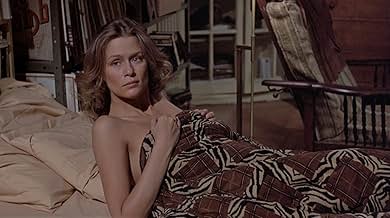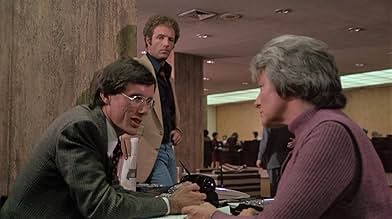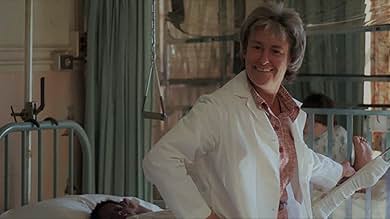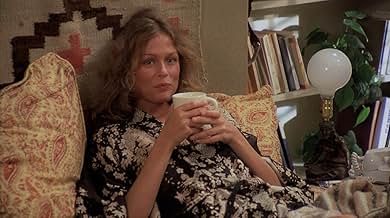Literature professor Axel Freed is a gambling addict. When he has lost his money, he borrows from his girlfriend Billie, then his mother Naomi, and finally some criminals that chase him. Des... Read allLiterature professor Axel Freed is a gambling addict. When he has lost his money, he borrows from his girlfriend Billie, then his mother Naomi, and finally some criminals that chase him. Despite all of this, he cannot stop gambling.Literature professor Axel Freed is a gambling addict. When he has lost his money, he borrows from his girlfriend Billie, then his mother Naomi, and finally some criminals that chase him. Despite all of this, he cannot stop gambling.
- Awards
- 1 nomination total
- Director
- Writer
- All cast & crew
- Production, box office & more at IMDbPro
7.17K
1
2
3
4
5
6
7
8
9
10
Featured reviews
A Forgotten Mainstream Character-Study or Neglected Cult Film?
In pop culture, before you had to "know when to walk away, know when to run," THE GAMBLER was synonymous with a Fyodor Dostoevsky novel and transcended into this 1970's film written by James Toback, directed by Karel Reisz and starring James Caan as university professor Axel Freed...
But Axel's real story isn't his job, but his vice, practically a religion: that of gutsy yet brainless gambling...
An addiction making him the user/loser of other people's money, including his own mother (more of a flirtatious step sister). But, while it's great seeing Caan facing the dark side of human nature, there's a lot to be desired when, for instance, he gets in over his head... and then some...
Shady characters come and go and sometimes return, ranging from Burt Young to Paul Sorvino, but their threats aren't all that... threatening. And while each performance is fitfully capable, it's as if the bookies, along with the audience, are passive observers to Axel's reckless and often ridiculous impulses.
Scenes with an extremely patient girlfriend/ingenue Lauren Hutton are overlong and distracting; her part feels tacked-on, mostly. And inside the classroom, as lecturer, Caan doesn't seem completely legit; he pulls off the roguish gambling addict better than a member of such a prestigious academia (plus he's an author), looking more like a tough guy football coach doubling as teacher...
Meanwhile, sporadic and strategic illegal backroom gambling sequences (filled with mafioso-looking inhabitants) lack the kind of severely desperate tension that these grungy locations aesthetically promise...
With so much to lose in each hand or roll of the dice or turn of the wheel, we should be biting our nails, and so should he... although a quick trip to Las Vegas does up the ante, injecting a needed dose of existential suspense into the otherwise languid visual prose.
Overall, Caan's steely reactions to the bottom continuously falling out are a standout... albeit kind of a shame since he often slips out of trouble faster than it takes to maintain an edgy pulse throughout; it's like watching a diver swim with toothless sharks...
And yet, if you're a fan of the infectiously likeable square-jawed actor (a perfectly equal hybrid of cult and mainstream cinema) this is definitely an intriguing two-hour melodrama that actually gets better with each viewing. What initially seems rather mundane becomes a voyeuristic character-study with subtle yet calculating finesse...
And given the ensemble-friendly era, there are a host of recognizable actors like one perturbed bookie, Jimmy, played by Carmine Caridi (who Francis Ford Coppola originally had in mind for what became Caan's game-changing role as Sonny Corleone in THE GODFATHER: then switched to a killer cameo in the sequel): He rules a memorable scene providing a deeper glimpse into Axel's addiction, and what might be the consequences...
Then there are future TV-fixtures Antonio Fargas, Lawrence Hilton-Jacobs, Stuart Margolin and Vic Tayback. M. Emmett Walsh also turns up and as a weenie banker is another James... Woods...
Specifically, when playing on cable, Time Warner Cable's top-of-the-screen index description states very simply: "James Caan in a study in self-destruction." And, well... that's pretty much that...
What sets out to be a proverbial X-ray of the soul winds up merely exposing bones. Then again, THE GAMBLER leaves most of the fleshing-out for an impartial and ambiguous audience. Which isn't so bad either.
But Axel's real story isn't his job, but his vice, practically a religion: that of gutsy yet brainless gambling...
An addiction making him the user/loser of other people's money, including his own mother (more of a flirtatious step sister). But, while it's great seeing Caan facing the dark side of human nature, there's a lot to be desired when, for instance, he gets in over his head... and then some...
Shady characters come and go and sometimes return, ranging from Burt Young to Paul Sorvino, but their threats aren't all that... threatening. And while each performance is fitfully capable, it's as if the bookies, along with the audience, are passive observers to Axel's reckless and often ridiculous impulses.
Scenes with an extremely patient girlfriend/ingenue Lauren Hutton are overlong and distracting; her part feels tacked-on, mostly. And inside the classroom, as lecturer, Caan doesn't seem completely legit; he pulls off the roguish gambling addict better than a member of such a prestigious academia (plus he's an author), looking more like a tough guy football coach doubling as teacher...
Meanwhile, sporadic and strategic illegal backroom gambling sequences (filled with mafioso-looking inhabitants) lack the kind of severely desperate tension that these grungy locations aesthetically promise...
With so much to lose in each hand or roll of the dice or turn of the wheel, we should be biting our nails, and so should he... although a quick trip to Las Vegas does up the ante, injecting a needed dose of existential suspense into the otherwise languid visual prose.
Overall, Caan's steely reactions to the bottom continuously falling out are a standout... albeit kind of a shame since he often slips out of trouble faster than it takes to maintain an edgy pulse throughout; it's like watching a diver swim with toothless sharks...
And yet, if you're a fan of the infectiously likeable square-jawed actor (a perfectly equal hybrid of cult and mainstream cinema) this is definitely an intriguing two-hour melodrama that actually gets better with each viewing. What initially seems rather mundane becomes a voyeuristic character-study with subtle yet calculating finesse...
And given the ensemble-friendly era, there are a host of recognizable actors like one perturbed bookie, Jimmy, played by Carmine Caridi (who Francis Ford Coppola originally had in mind for what became Caan's game-changing role as Sonny Corleone in THE GODFATHER: then switched to a killer cameo in the sequel): He rules a memorable scene providing a deeper glimpse into Axel's addiction, and what might be the consequences...
Then there are future TV-fixtures Antonio Fargas, Lawrence Hilton-Jacobs, Stuart Margolin and Vic Tayback. M. Emmett Walsh also turns up and as a weenie banker is another James... Woods...
Specifically, when playing on cable, Time Warner Cable's top-of-the-screen index description states very simply: "James Caan in a study in self-destruction." And, well... that's pretty much that...
What sets out to be a proverbial X-ray of the soul winds up merely exposing bones. Then again, THE GAMBLER leaves most of the fleshing-out for an impartial and ambiguous audience. Which isn't so bad either.
Classic 70s film about addiction
The theme of addiction is a favourite area for film makers and "The Gambler" stands as the best and most intelligent film about the addiction of gambling. The fact that it is a little known or seen film is perhaps to do with its intellectual script which, with references to Dostoyevsky, may be too pretentious for some. However, rather than being a cleched film about a good man's decent into the hell of addiction this is a film about a selfish, egotistical man, from a good background, who happily wades deeper and deeper into his obsession.
The film's title pretty much sums up the story, with the character of Axel Freed, played by James Caan, beginning the film as a compulsive gambler but sinking further and further into his habit as the film goes on. He does this despite his undoubted intelligence - he is a college lecturer - and despite the pleading of his mother, rich grandfather and friends.
Freed is by no means a likeable character. Like most addicts all he cares about is his next fix and will happily ask his mother for tens of thousands of dollars to repay an outstanding debt. No one, including his girlfriend, played by Lauren Hutton, and his college students, remain untouched by his addiction, a decision which comes back to haunt him in the film's climax.
Many people have been left puzzled by the film's ending which is cryptic and unresolved. However this merely stands as a metaphor for addiction generally, that it can never be fully cured or ever totally go away. Axel is, however, obviously disgusted with himself and the effect his gambling has had on those around him and his late night journey into the all-black neighbourhood is his way of seeking retribution for his sins.
"The Gambler" provides James Caan with, alongside Michael Mann's "Thief", the best role of his career. The character of Axel Freed provides him with a range of emotions, especially in the way he treats those he cares about, as his gambling slowly takes precedence over everything else. Anyone who thinks James Caan's career began and ended with "The Godfather" should definitely see "The Gambler", as this proves he is one of the top actors of his generation and that he can play more than just the tough guy roles he is too often saddled with.
The film is brilliantly directed by Karel Reisz as not a single scene rings false despite a 111 minute running time. After directing the classic "Saturday Night and Sunday Morning" in Britain, Reisz relocated to America, but, unfortunately, "The Gambler" represents the only time he reached those heights again.
The film's title pretty much sums up the story, with the character of Axel Freed, played by James Caan, beginning the film as a compulsive gambler but sinking further and further into his habit as the film goes on. He does this despite his undoubted intelligence - he is a college lecturer - and despite the pleading of his mother, rich grandfather and friends.
Freed is by no means a likeable character. Like most addicts all he cares about is his next fix and will happily ask his mother for tens of thousands of dollars to repay an outstanding debt. No one, including his girlfriend, played by Lauren Hutton, and his college students, remain untouched by his addiction, a decision which comes back to haunt him in the film's climax.
Many people have been left puzzled by the film's ending which is cryptic and unresolved. However this merely stands as a metaphor for addiction generally, that it can never be fully cured or ever totally go away. Axel is, however, obviously disgusted with himself and the effect his gambling has had on those around him and his late night journey into the all-black neighbourhood is his way of seeking retribution for his sins.
"The Gambler" provides James Caan with, alongside Michael Mann's "Thief", the best role of his career. The character of Axel Freed provides him with a range of emotions, especially in the way he treats those he cares about, as his gambling slowly takes precedence over everything else. Anyone who thinks James Caan's career began and ended with "The Godfather" should definitely see "The Gambler", as this proves he is one of the top actors of his generation and that he can play more than just the tough guy roles he is too often saddled with.
The film is brilliantly directed by Karel Reisz as not a single scene rings false despite a 111 minute running time. After directing the classic "Saturday Night and Sunday Morning" in Britain, Reisz relocated to America, but, unfortunately, "The Gambler" represents the only time he reached those heights again.
Am I the only one who understands the underlying theme?
Just about everyone who has posted a reply about the shocking ending was simply left too much in the dark to realize that it tied together a different root demise of Axel Freed than gambling.
Just as a compulsive behavior leads to compulsive gambling, the root evil of Axel Freed was that he had a masochist behavior. When you look a little closer at all the scenes where he acts out this kind of behavior, it makes more sense. The problem lies in that the casual observer is only looking at the problem gambling aspect. There is more to this guy than just that.
The ways he handles his relationships with his mother, girlfriend, grandfather and feelings at the end towards the basketball player ALL indicate there is masochist behavior involved. These are more than just selfish acts. There is some actual self hatred going on as well. Without giving away the final scene, this scene further accentuates the point by sending himself into that situation. The final scene was a conscious act, not something resulting from random chance or risk.
So despite the movie having some gambling theme to it, this really wasn't necessarily about gambling addiction. It was about the nature of Axel Freed. If the movie had no gambling scenes in it at all this point would be more readily identifiable.
The only real oddity in the final scene is the placement of the final scene. If this scene was placed somewhere in the middle of the movie, the underlying theme of his masochist pattern of behavior would have been more easily identified with. Because the movie started with a gambling scene, we all assumed it was just about gambling. Wrong!
Its a tricky concept to catch the first time. Watch this movie again with this concept in mind and the movie will make more sense.
Just as a compulsive behavior leads to compulsive gambling, the root evil of Axel Freed was that he had a masochist behavior. When you look a little closer at all the scenes where he acts out this kind of behavior, it makes more sense. The problem lies in that the casual observer is only looking at the problem gambling aspect. There is more to this guy than just that.
The ways he handles his relationships with his mother, girlfriend, grandfather and feelings at the end towards the basketball player ALL indicate there is masochist behavior involved. These are more than just selfish acts. There is some actual self hatred going on as well. Without giving away the final scene, this scene further accentuates the point by sending himself into that situation. The final scene was a conscious act, not something resulting from random chance or risk.
So despite the movie having some gambling theme to it, this really wasn't necessarily about gambling addiction. It was about the nature of Axel Freed. If the movie had no gambling scenes in it at all this point would be more readily identifiable.
The only real oddity in the final scene is the placement of the final scene. If this scene was placed somewhere in the middle of the movie, the underlying theme of his masochist pattern of behavior would have been more easily identified with. Because the movie started with a gambling scene, we all assumed it was just about gambling. Wrong!
Its a tricky concept to catch the first time. Watch this movie again with this concept in mind and the movie will make more sense.
7sol-
My brief review of the film
A gritty, realistic film about addiction, it has a bit of haunting atmosphere to it, and although awfully dreary and a touch too harrowing for its own good, the film still packs a punch. Caan has a very interesting character, one who understands his own addiction yet still deceives himself, and he gives off a very solid performance, even though his character does come off rather cold and a bit hard to relate to. What the film shows us and what happens is quite predictable, but that does not prevent it from still having potency, and the ending certainly is not predictable, and is actually rather fascinating. The film's music score fits the project perfectly, and the driving sequences depict the character's feelings very well. Certainly this worth checking out, even if it is no cinema masterpiece.
Worth the Gamble
I saw this movie back in 1974/75 when it was released. I was already a Caan man. My comments are just random tidbits. Burt Young would go on to join Caan in 1975's The Killer Elite". Monkey (London Lee) was a stand-up comic who appeared numerous times on the Ed Sullivan show in the 60's. Lauren Hutton would trade Caan for Burt Reynolds in Gator. Caan earlier had beat out Burt for the role of Sonny Corleone. The line I remember most from this film is when Axel's mother is trying to get a bank loan to fund his gambling debt. There are some bureaucratic snafus and the bank officer isn't sure he has the proof to approve the loan to mom. Caan says "I came out of her womb and I know she's my mom. Now give her the god... money!".
Did you know
- TriviaAccording to James Toback, before his screenplay was accepted at Paramount Pictures, and was making the rounds with actors, Peter Boyle was first interested in playing the lead. Robert De Niro lobbied hard for the role, to the point where De Niro started to dress like the writer. Toback pressured director Karel Reisz to meet with De Niro. After meeting him, Reisz said that he would not, and could not consider De Niro for the role, and if Toback kept insisting, he would not be allowed to collaborate on the film further.
- GoofsAxel knocks the pimp's hat off on the second punch. It reappears on his head on the following one.
- SoundtracksSymphony No. 1 in D
Written by Gustav Mahler (as Mahler)
Performed by Koninklijk Concertgebouworkest (as The Concertgebouw Orchestra)
Conducted by Bernard Haitink (as Haitink)
Courtesy of Philips Records
- How long is The Gambler?Powered by Alexa
Details
Box office
- Gross US & Canada
- $1,305,782
- Runtime
- 1h 51m(111 min)
- Sound mix
- Aspect ratio
- 1.85 : 1
Contribute to this page
Suggest an edit or add missing content



































